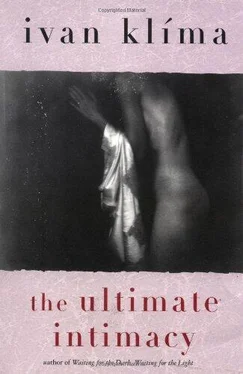Ivan Klima - The Ultimate Intimacy
Здесь есть возможность читать онлайн «Ivan Klima - The Ultimate Intimacy» весь текст электронной книги совершенно бесплатно (целиком полную версию без сокращений). В некоторых случаях можно слушать аудио, скачать через торрент в формате fb2 и присутствует краткое содержание. Год выпуска: 1998, Издательство: Grove Press, Жанр: Современная проза, на английском языке. Описание произведения, (предисловие) а так же отзывы посетителей доступны на портале библиотеки ЛибКат.
- Название:The Ultimate Intimacy
- Автор:
- Издательство:Grove Press
- Жанр:
- Год:1998
- ISBN:нет данных
- Рейтинг книги:3 / 5. Голосов: 1
-
Избранное:Добавить в избранное
- Отзывы:
-
Ваша оценка:
- 60
- 1
- 2
- 3
- 4
- 5
The Ultimate Intimacy: краткое содержание, описание и аннотация
Предлагаем к чтению аннотацию, описание, краткое содержание или предисловие (зависит от того, что написал сам автор книги «The Ultimate Intimacy»). Если вы не нашли необходимую информацию о книге — напишите в комментариях, мы постараемся отыскать её.
The Ultimate Intimacy — читать онлайн бесплатно полную книгу (весь текст) целиком
Ниже представлен текст книги, разбитый по страницам. Система сохранения места последней прочитанной страницы, позволяет с удобством читать онлайн бесплатно книгу «The Ultimate Intimacy», без необходимости каждый раз заново искать на чём Вы остановились. Поставьте закладку, и сможете в любой момент перейти на страницу, на которой закончили чтение.
Интервал:
Закладка:
She had scarcely reached puberty, which happened around her thirteenth year, when she started to draw the attention of all kinds of men, from her own age group up to men old enough to be her father, but nothing convinced her that she was worthy of genuine interest, let alone love and admiration.
She married when she was nineteen. She tried to persuade herself it was because she was attracted to the man, but more likely it was because she wanted to leave home. Filip, her first husband, was closer to her father's generation, though he was nothing like her father, which was probably what attracted her to him most. He had an interesting and manly job — airline pilot — and spoke several languages, was a good tennis-player and an equally good dancer. Admittedly, he did have one thing in common with her father: he liked to talk about death, not hers but his own — one day his plane might crash. When he first told her this, she clasped him in her arms and begged him to give up flying as she was afraid for him. Her fear evidently excited him, as from then on he would take pleasure in recounting to her the disasters that had cost his colleagues their lives.
At the time of their marriage, she was in love with him and genuinely anxious about him, to the extent of going to meet him at the
airport during the first few weeks. He loved her too and prided himself on having such a young, beautiful and interesting wife. As he flew on overseas routes, he used to bring her expensive (and, to most people in the country, inaccessible) gifts. When in time he noticed that her devotion exceeded the level of affection he was accustomed to, he fell prey to the usual masculine vanity. Bára was his property, a mere accessory to his perfection. He started to treat her with increasing unkindness, constandy stressing all her faults: she wasn't punctual, she lacked purpose and didn't even pass muster either as a wife (she paid too much attention to studying instead of to him) or, later, as a mother. Little Saša screamed (because of her, naturally) often the whole night through, when he needed to sleep so as to be fresh for work the next day. He crushed the last remnants of any self-confidence she had. When she discovered that while she was spending her days and nights (or at least that was how it seemed to her) looking after him and his little boy, he was off making love to some air hostess, he explained to her that it was her fault for not creating a proper home.
She rushed straight back to her mother. Was it possible, she asked her, that men could be so mean, so blind to anything but themselves, so selfish, that they were incapable of seeing a true picture of the world or of their nearest and dearest? But her mother was too devoted to her own husband, who had actually saved her life, to accept such a generalization. She counselled Bára to be more patient, as she too had been patient.
Bára now began to think about doing away with herself after all, of entering the darkness for good and making a thorough job of it this time. The trouble was, things had changed: now she had a son to consider. So instead of killing herself she got a divorce. Shortly afterwards she fell in love with a man with a biblical name, a builder of Towers of Babel, as she used to call him. At that time, Saša was three and Samuel forty-three. He was actually two years older than her first husband, once divorced (he would divorce a second time on her account) and had a daughter from each of his marriages. She married him — she was convinced — out of love; she admired him and for a long time believed she had found the very best of men. She gave up her acting studies for him, and transferred to a course in architecture. Almost every day during the first months and even years after their marriage they would talk about the work that united them, mostly about his projects, which
were surprisingly unconventional and liberal for their time. They would also pore over the specialized foreign journals that he was able to get hold of, and discuss — she with greater tolerance, he mostly with his own particular kind of haughtiness — all the various architectural and building projects around the globe.
When she had completed her studies, she realized that while they might share the same opinions about new materials and how the building of high-rise, pre-fabricated housing estates was a crime, on the most essential thing they would never agree: for her, the most important thing in life was the man she loved, whereas for him it was his work or rather success in his work — in other words his career. Compared to her first husband he was more cultured and well-mannered, but he increasingly required her to subordinate herself to the routine and lifestyle to which he had become accustomed. What this routine required from her was to minister to his comfort. Its aim was to ensure him peace and quiet for his work. For his wife and his own son there remained little time in his life and even less enthusiasm. For his stepson there was nothing at all; he should be content that he had a place at the table and a bed to sleep in. At first Bára strove to satisfy his requirements in an effort to wring out of him a recognition which she wrongly confused with love. There was never any acknowledgement; her acquiescence merely fed his sense of superiority. She soon realized that her second husband was also selfish and self-centred and she was merely an adjunct to his ego, simply a very young mother caring for an ageing child. Her relative youth just meant it was an even greater sacrifice.
And so, after a few years of marriage, Bára started once more to be troubled by the thought that her life was slowly slipping away and she was achieving none of the things she longed for. The dusk was gradually falling, the night was approaching and she got less and less chance to enjoy the sun.
At that time she started to imagine love with another man; for the time being he was indeterminate, and most likely non-existent and therefore unattainable: a kind, unselfish and wise person who would not genuflect with admiration before his own ego and not regard his wife as a mother to look after him. But these fantasies did little to help her, they were so utterly unattainable that they merely left her dejected and she began to suffer bouts of depression again. She resisted the temptation to be unfaithful not so much out of moral conviction but
more out of fear of her husband killing her if he were to find out. He was jealous by nature and he grew more suspicious with age. Apart from that, she had no wish to harm someone with whom she had had many good times, with whom she had once been deeply in love and who had given her much.
At the onset of depression she would generally consult a tarot reader whose predictions contained much to raise her spirits: unexpected good fortune or a man who would steal her heart. She even predicted her a new marriage. When the depression was at its worst, Bára would lose all interest in life and be terrified of death. She would want to run away somewhere, put an end to something and start something afresh. What was there for her to start afresh, though? And she had nowhere to run to. Besides, she now had two sons and they needed her and she loved them.
In the course of her life she had acquired a number of woman friends. When she was in a good mood and managed to snatch a free evening for herself, she would call on Helena, a fellow student from her second period of study. Helena was the sort of person she could go to a wine bar with to drink wine and chat about nothing in particular. When she needed advice on child-rearing or consolation during desolate periods of marital vexation she would seek out Ivana, whom she had known since the time they were both studying acting at the Academy. Even though Bára abandoned the course after the third year and never returned to the Academy, the friendship remained. Ivana never went into acting but got married and had three children in five years. Her hobby was homoeopathy. Whenever Bara's anxiety states were at their height she would rush off to her friend who would prescribe for her anacardium or pulsatilla, although the remedies would never work. Either Bára didn't take them for long enough, or she didn't dilute them enough, or she and Ivana were simply not capable of determining her fundamental problem.
Читать дальшеИнтервал:
Закладка:
Похожие книги на «The Ultimate Intimacy»
Представляем Вашему вниманию похожие книги на «The Ultimate Intimacy» списком для выбора. Мы отобрали схожую по названию и смыслу литературу в надежде предоставить читателям больше вариантов отыскать новые, интересные, ещё непрочитанные произведения.
Обсуждение, отзывы о книге «The Ultimate Intimacy» и просто собственные мнения читателей. Оставьте ваши комментарии, напишите, что Вы думаете о произведении, его смысле или главных героях. Укажите что конкретно понравилось, а что нет, и почему Вы так считаете.






![Theresa Cheung - The Dream Dictionary from A to Z [Revised edition] - The Ultimate A–Z to Interpret the Secrets of Your Dreams](/books/692092/theresa-cheung-the-dream-dictionary-from-a-to-z-r-thumb.webp)





